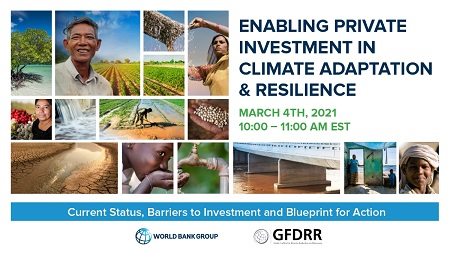
A new World Bank report with contributions from the Global Infrastructure Facility identifies ways to overcome key barriers to private sector investment in adaptation and resilience, laying out a coordinated and data-driven Blueprint for Action to help governments and their development partners to close the adaptation finance gap. Although climate adaptation finance flows have increased by 35% in recent years, they still fall short of what is needed to avoid severe economic and human impacts from climate change. The urgent need for boosting investment in climate adaptation and resilience cannot be overstated. Much remains to be learned about how to unlock and enable private capital to help finance national and local adaptation priorities, and how to build the business case for adaptation. The report offers a snapshot of current levels of private financing for climate adaptation and how they fit into global efforts to finance climate resilience-building around the world. It documents the main barriers that have stymied private investment in adaptation to date.
The report proposes a blueprint for action--a concrete stepped approach for governments to address barriers to private investment in adaptation and resilience--so that private capital can actively contribute to financing national and local priorities. Five entry points to enable private investment are expolored. It is a novel coordinated framework for action, driven by countries’ goals and national investment plans that can help accelerate and scale up investment to address the climate resilience needs of the world’s most climate-vulnerable communities and economies.
Download the Report here.
Read the Blog here.
Citation “Tall, Arame; Lynagh, Sarah; Blanco Vecchi, Candela; Bardouille, Pepukaye; Montoya Pino, Felipe; Shabahat, Elham; Stenek, Vladimir; Stewart, Fiona; Power, Samantha; Paladines, Cindy; Neves, Philippe; Kerr, Lori. 2021. Enabling Private Investment in Climate Adaptation and Resilience: Current Status, Barriers to Investment and Blueprint for Action. World Bank, Washington, DC. © World Bank. https://openknowledge.worldbank.org/handle/10986/35203 License: CC BY 3.0 IGO.”











